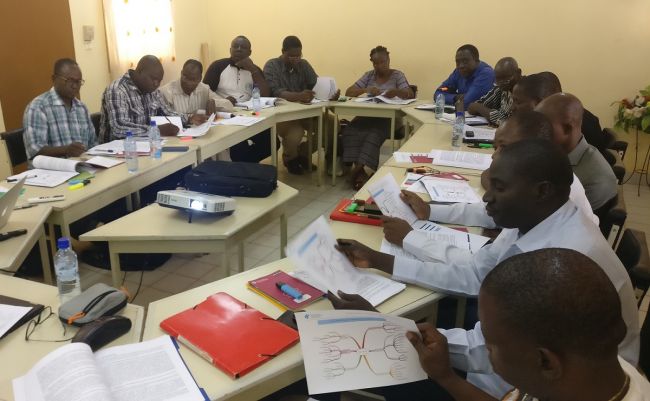Burkina Faso: Education unions are key to developing quality policies for teachers
The Norwegian Government is funding a two year programme in four African countries, Burkina Faso, Ghana, Malawi and Uganda, entitled "Strengthening Multi-Partner Cooperation to Support Teacher Policy and Improve Learning".
This programme is coordinated by UNESCO, and includes several stakeholders: UNICEF, the United Nations High Commissioner for Refugees, the International Labour Organization, the World Bank, the Global Partnership for Education, and Education International (EI).
The first round of meetings launching the project in Burkina was held between 4 and 6 June in Ouagadougou. In order to prepare for this, EI had organized two workshops, on the 12-13 April and 30 May-1 June, which brought together all the 15 unions making up the CNSE (Coordination nationale des syndicats de l’éducation).
Social dialogue is greatly needed
The education unions were not initially invited at any time to contribute in terms of analysis and proposals to either the State Report of the National Education System (RESEN), published in 2017, or the Sector Education and Training Program (PSEF) 2018-2030. As a result of inter-union action which started on 5 October 2017, the CNSE signed a Memorandum of Understanding with the new minister last January.
Subsequently, a round of bilateral meetings has been put in place to bring the MoU into effect, a fairly encouraging indication as regards prospects for permanent dialogue. Moreover, certain measures in this MoU were included in the PSEF, such as a focus on children from the poorest families, who now have priority in benefiting from scholarships.
The MoU’s flagship measure, the adoption of a status which recognises the value of teachers, is still a subject of negotiation. In fact expectations at the grass roots are high and they could increase the pressure if the anticipated measures do not match demands.
Unions: expertise and a source of proposals
At the workshops organised by EI, participants did some very thorough work on the action plans included in the PSEF as regards the three themes of access, quality, and guidance. A mastery of the issues discussed, is an indispensable first step in any quality social dialogue, but the unions’ task is made more difficult because there is no law which provides members for time off work on trade union duties.
At the meeting organized by the Ministry and UNESCO, attended by representatives from the world of education, the Burkina Faso unions very clearly expressed their great interest in this project which offers to support the development of a policy for teachers.
"I think this is a good project because it puts the focus on teachers, so that learners can benefit", was the analysis of Anatole Zongo, Secretary General of the Syndicat national des enseignants du secondaire et du supérieur.
The unions have indeed shown that they were tackling this multi-partner work with an open mind and with the intention of putting forward proposals that are closely linked to the situation in the field. They emphasised the importance of a judicious and transparent use of the resources available.
“This project is a test for assessing the real willingness of the Ministry to engage in dialogue with the unions on a permanent basis”, is the view of EI’s Coordinator, Florian Lascroux. EI will, for one year, organize training workshops, and workshops covering all activities likely to strengthen the CNSE unions, in order to enable them to fully play their part in representing the profession to the authorities.
EI’s Coordinator, Jefferson Pessi, insists on the fact that "this type of initiative, aimed at involving unions in the development and implementation of education sector plans, by forging a link between general policy objectives and their implementation for teachers, is fundamental to strengthening the trade union movement".

[Thu, 14 Jun 2018 11:17:00 +0000] | DIGG THIS
Education International · No. 3 Torshie Close, · Mempeasem · East Legon Extension · Accra · Ghana
Phone: +233.302.50.12.00 · Fax: +233.302.50.66.81 · Email: eirafoffice@ei-ie.org
